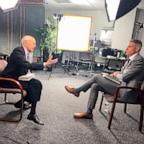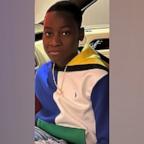Book Excerpt, 'Choosing Naia'
Dec. 24 -- What do you do when you find out the baby you are carrying has a birth defect? Choosing Naia: A Family's Journey follows the lives of a 30-something couple who discover that their child will be born with Down syndrome from their decision to continue the pregnancy through the baby's first years of life.
Exerpted from Choosing Naia, by Mitchell Zuckoff.
Chapter 1:
"Don't worry, mom.everything will be fine" Mom, did you have a baby shower?""No, Tierney. But there was a reason."
Tierney Temple-Fairchild and her mother, Joan Temple, were passing time in Tierney's car, driving northeast on Interstate 84 outside Hartford. It was a late afternoon in early May. The sun was bright, the spring air was warm, and new leaves graced the trees lining the highway. Forsythia bushes were ablaze with yellow blossoms.
Mother and daughter had been talking about work, weather, and nothing terribly important. Then Tierney casually asked about the shower. The question brought to her mother's mind a memory, long buried in the place that stores unsent letters, unpaid debts, and unmade apologies. Joan could see no reason not to share it with her youngest child.
It was forty years ago, Joan began. She was a young married woman, around Tierney's age, pregnant with the first of her three children, Tierney's brother, George. As she neared the end of her pregnancy, one of her closest friends delivered a stillborn child. It came as a devastating shock; the friend had already painted the nursery, assembled a layette, and dreamed the dreams of all happy first-time mothers.
After her friend's loss, Joan told Tierney, she wouldn't allow anyone to throw her a baby shower. She didn't want to celebrate in the wake of her friend's tragedy, and she didn't want to tempt fate by acting immune to such pain. Lightning had struck someone standing next to her, Joan figured, and she wasn't about to wave an umbrella in the air. No one could persuade her otherwise, and Joan had dug in her heels right up to the moment her water broke. She had so refused to prepare for a baby that Tierney's father had missed the birth of his namesake son. He was out buying a crib.
Tierney listened quietly. Normally she loved hearing family stories. But as Joan spoke, Tierney gripped the steering wheel and kept her eyes trained on the road ahead. When Joan finished, Tierney quickly changed the subject.
Tierney had a secret she was keeping from her mother, and the last thing she wanted to talk about was a stillborn child. That could lead to thoughts about bad omens and a mother's intuition, and no good could come of that. The conversation moved on, and Joan let the memory drop.
What Joan couldn't possibly have known was that next to her on the front seat, tucked safely in Tierney's purse, were the first recorded images of her first grandchild.
One night several weeks earlier, Tierney had been at home with her husband, Greg Fairchild, in the book-filled one-bedroom apartment they shared in a convenient but unlovely part of downtown Hartford. They had just come home from dinner at a nearby restaurant, and they were alone except for their excitable black poodle, Onyx.
Almost on a whim, Tierney decided to break out the last in-home pregnancy test in her medicine cabinet. She had already gone through nearly a dozen, each one a disappointment. Tierney's urine had never revealed a pastel stripe, a red cross, or any other indication that parenthood was in their future. Tierney had equally low expectations for the plastic wand she held in her hand. She suspected that she had ovulated when she was out of town for several days on a business trip, costing them yet another month.
Tierney and Greg had known each other for almost nine years. They had been in love for eight, married for nearly four. A graduate student, Greg was thirty-four. A corporate manager, Tierney was thirty-one. They'd trash-canned their birth control almost a year earlier, feeling ready to start working on their imagined ideal family: three children, two biological and one adopted.
When Tierney hadn't become pregnant during the first few months of trying, both of them had grown anxious but neither felt panicked. Tierney had been on the Pill, and they knew it might take six months or so for her body to readjust its cycles and begin ovulating normally again.
When those six months passed and nothing happened, Tierney sought answers from her obstetrician/gynecologist, Dr. Michael Bourque, whom she had known since she was nineteen. A battery of tests showed that she still wasn't ovulating, so Bourque had started her on a relatively low dose of a fertility medicine called Clomid, a synthetic compound in a class of drugs called antiestrogens. Clomid is a first-line offense against infertility, designed to trigger a woman's body to produce an egg ready for fertilization.
Bourque had told Tierney not to worry, but it wasn't easy as more months came and went. She and Greg began wondering if they'd ever be able to conceive. They started thinking about costly and invasive fertility procedures. They discussed whether a sperm or egg donor might be necessary, or whether they might have to adjust their family plans altogether and go straight to adoption.
By spring, Tierney had reached what Bourque said was the highest dosage he would prescribe of Clomid before sending her to a fertility specialist. He knew that among patients treated with Clomid, 95 percent who become pregnant do so within the first six months of taking the drug.




